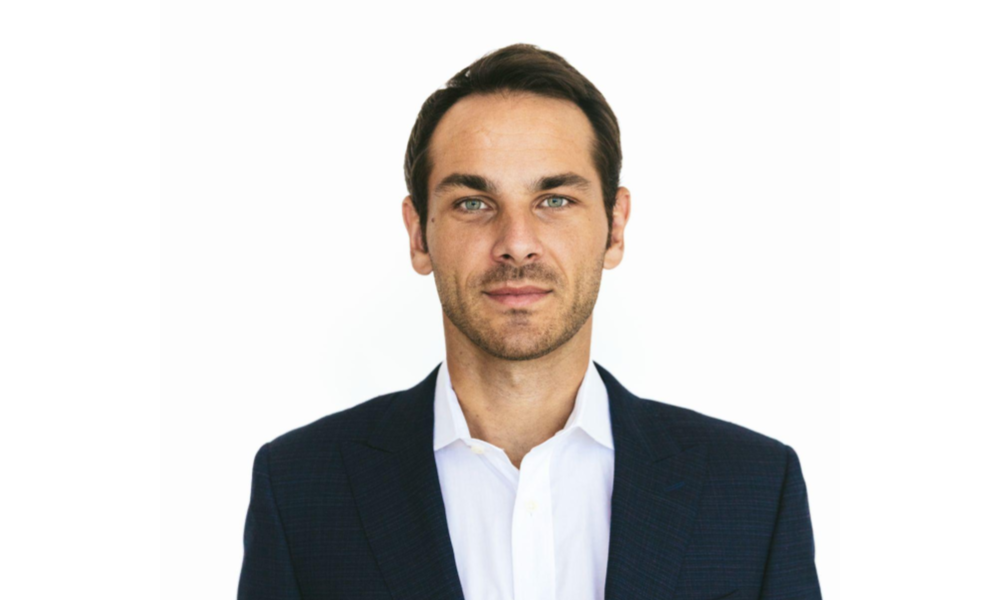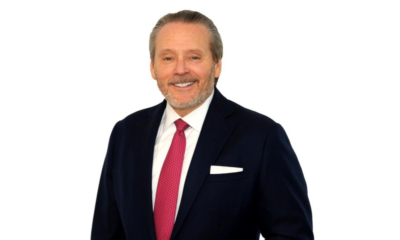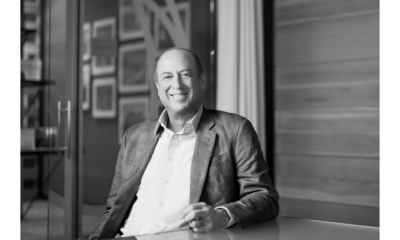Financing
Inside the Boardroom: Matija Pecotic
By
Joseph Richter

Matija Pecotic recently beat Jack Sock, the former No. 8 ranked tennis player in the world at the Delray Beach Open. His day job? A Director at Wexford Real Estate. We sat down with the 33-year old tennis sensation to discuss his fascinating journey, how he’s juggling two careers, and thoughts on the market.
Daily Beat: Can you please share your background?
Matija Pecotic: I was born in Belgrade, Serbia. My parents fled the war and moved to the Island of Malta.
We lived there for 17 years – I had a great upbringing. I enjoyed school and loved sports. When I was teenager, I wanted to discover what was beyond the Island.
Daily Beat: And I guess that’s where tennis comes in?
Matija Pecotic: Yes. I recorded videos of myself playing and uploaded them to YouTube. I also burned it onto a DVD and sent 200 copies to every college in the United States.
The head coach at Princeton responded! We started a conversation, and one year later I was attending the school. That was the first big domino piece in my life. Turning a kid from a small Island into an Ivy Leaguer.
I had a very close relationship with the coach and I ended up becoming the captain of the Princeton team. When it was time to graduate, my classmates at Princeton were going into hedge funds, consulting, and private equity. I decided to continue to focus on tennis.
Daily Beat: What were your next steps?
Matija Pecotic: I had to figure out how to find a backer to go on to the tennis tour. A couple of months after graduating, I met Bill Ackman and he decided to invest in my tennis career.
We entered a partnership – it wasn’t a sponsorship. This was a business transaction.
Daily Beat: Is this something that’s prevalent in the tennis world?
Matija Pecotic: No. Tennis players are not that entrepreneurial, so it’s very rare. Novak Djokovic had a backer when he was 12, but it’s very uncommon.
I had to figure out a way to get someone to fund me because you’re bleeding cash for the first two to three years and are similar to a startup.
Daily Beat: That’s so fascinating that you viewed your tennis career like a business.
Matija Pecotic: Yes. It’s very much a business. I just happen to be the asset. Instead of building a product, I am the product.
Daily Beat: Bill Ackman’s late father Larry was the CEO of Ackman-Ziff, so Bill has a lot of real estate blood.
Matija Pecotic: Yes. Bill is a great teacher and it was really through that interaction that I started getting excited about the business side of life. I learned everything I could from him; read all the books he recommended, and started following Pershing Square closely.
I wrote him quarterly reports and annual letters. We had fun with it.
Within two years, I rose to the 200 ranked player in the world, but an injury and an infection after the surgery threw off my tennis timeline.
At that point, I decided that I wanted to get into the business world. Bill advised me to work for his family office and apply to Harvard Business School, which is what I did.
Daily Beat: How was the experience at the family office?
Matija Pecotic: Great. I started getting exposure to deals and understanding the way Bill and his late father Larry thought about things.
Daily Beat: And then what did you decide to do after Harvard Business School?
Matija Pecotic: I decided to go back and play tennis for a year, and got to the top 300 in the world, but then Covid hit and the tour got canceled.
I ended up in Palm Beach at an Israel tennis fundraiser event, and that’s where I met Joe Jacobs of Wexford. With the tour canceled, I decided to go and work for their firm.
Daily Beat: What’s your role at Wexford?
Matija Pecotic: My role is twofold. The first is to find development sites that we can potentially acquire and develop. My second responsibility is to be the Ambassador for Wexford outside of the office on the capital markets side.
Historically, we used to invest in our real estate through our own balance sheet, but as the founders grow older, there’s been a concerted effort to grow the platform into a real business and open up opportunities to outside investors.
Daily Beat: So you’re both on the acquisitions and capital markets side?
Matija Pecotic: Yes. Joe wants me to get exposure to as many different parts of the firm, so I’m rotating across a couple of different roles. We don’t have a fund and do things on a deal by deal basis, and I help with the fundraising.
Daily Beat: How many tournaments are you going to play this year?
Matija Pecotic: I plan on playing 25 this year.
Daily Beat: How are you managing your schedule?
Matija Pecotic: From 8:00am to 12:00pm, I’m a professional athlete and then from 1:00pm and on, I’m a real estate professional.
Daily Beat: The story of how you ended up playing in the tournament is incredible. Can you please share it?
Matija Pecotic: I’m not ranked high enough anymore to get into the marquee events. This event was the highest level of tennis outside of the Grand Slams.
I signed up but didn’t get in. Given that it’s down the street, I showed up a day before to try again, but didn’t get in.
Then on the day of the match, I happened to have left some rackets at the club. When I went to pick them up, the tournament director bumped into me and told me to stick around because one participant might pull out.
When the spot opened up, I was thrown into the tournament ranked 784 in the world. My first match was against the former number 8 in the world, Jack Sock. Everyone thought he was going to just blow right past me, but I had different plans!
Daily Beat: What similarities do you see between athletes and real estate professionals?
Matija Pecotic: In my mind, they are just two different kinds of athletes. Both are extreme competitors.
Everyone likes associating tennis with the country clubby gentleman mentality, but this is war and just as much as it is in business. You are fighting for a finite resource and it’s a zero sum game.
What you lose is another persons’ gain. The most prepared players and investors usually do the best. The ones who are able to outthink the other person are the ones that get ahead. It’s not just brute force that guarantees a victory, it’s very much a cerebral exercise.
That’s why all these business guys love sports because they recognize that it’s a thinking man’s sport just like real estate investing, so those are the parallels.
Daily Beat: Can you please speak to Wexford’s approach in this environment?
Matija Pecotic: Wexford’s core focus has recently been multi-family ground-up development. We have a couple of sites in Boca that are currently under development, in addition to one in Flagstaff, Arizona. The projects are doing well and are on budget.
The firm believes that new projects are going to be tricky. We got some estimates for a site in downtown West Palm Beach, and we almost got a heart attack when the hard costs came back. New deals are not going to pencil out for a while.
We’ve been starting to poke around looking to buy existing multi-family assets, but the spread is still pretty wide.
Daily Beat: That Bid-Ask Spread continues to widen.
Matija Pecotic: Yes. People are still asking for yesterday’s prices and cap rates have compressed to where it still doesn’t make sense for us to buy.
Daily Beat: It sounds like you’re pretty opportunistic in your approach.
Matija Pecotic: Yes. Wexford is not wedded to development. In fact, we only want to develop when we can build at a discount relative to the cost of buying when taking the additional risk and aggravation of development into account
These spreads move around, and so do property types. To illustrate, if we could buy office at $1 /sf vs. $1,000/ sf, we would obviously choose office. In this environment, we are therefore looking at multi-family sites because that’s still compelling, but if the spread shrinks enough we will look at buying existing assets.
And since most residential deals don’t pencil out today, the development sites we are looking at have optionality. They are cheap enough to hold onto and allow us to build when the numbers work again.
Daily Baat: How many people work in the firm?
Matija Pecotic: We have around 10 employees in the company.
Daily Beat: What’s Wexford’s thesis on the barrier to entry in Florida with land prices much lower than markets like New York City? Are you concerned with the rapid growth in inventory?
Matija Pecotic: Florida is in a protected spot given the tailwinds that it has going for it. The migration trends have been urban to suburban and north to south, and we don’t think that’s going away.
Businesses continue to relocate here, as people are getting fed up with either the politics or taxes in their states. I think that trend continues.
Ten years ago in Miami, the typical check size for a hospital philanthropy donation was $100,000. Today, the average check size is $10 million. I find that tracking philanthropy dollars is a very good indicator of trends.
Ultimately, the key is finding good sites and saying no to a lot of deals.
Daily Beat: Do you see a shift at these corporate events? Are people more interested in talking to you with your newfound fame?
Matija Pecotic: Fame is a fleeting experience. One person wisely told me, “people don’t love you, they love what you can do for them. And when you can’t do that anymore, they forget you.”
I’ve had fun at a couple of events where people recognize me. My LinkedIn was previously getting like 37 views a week, and now I’m getting 22,000!
People have come to know the Wexford name and have reached out. A lot of them are just fans and excited by the story, but amongst those inbound messages, you find some interesting people.
*The interview has been edited and condensed for clarity.





